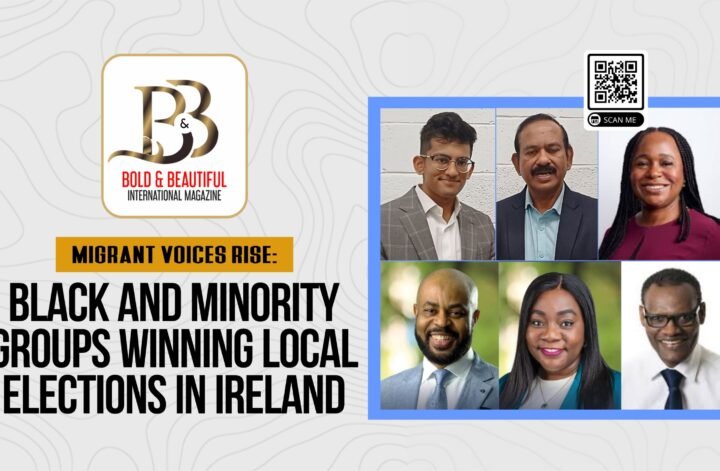The local elections held in Ireland in 2024 have produced groundbreaking and thrilling results, with individuals from migrant backgrounds securing major wins. This marks a significant moment in Irish politics, showcasing the increasing power and influence of minority groups in the country. The momentum from these victories is palpable, and there is a sense of optimism for even more positive outcomes in the future. The results of these elections demonstrate a shift towards greater diversity and representation in Irish politics, reflecting a changing and more inclusive society.

Honore Kamegni has made history by becoming the first Black councillor in Cork, representing the Green Party in Cork South East. In Galway, Labour’s Helen Ogbu achieved a groundbreaking win, becoming the first Black woman elected to the City Council. Her journey from seeking protection to becoming a Labour councillor is a remarkable testament to her resilience and dedication. Similarly, Ejiro Ohare Stratton, a Black female Fine Gael candidate, has just been elected in Drogheda Urban, marking another milestone for diversity in Irish politics.
Adding to these successes, Cllr Adejinmi Uruemu of Longford LEA – Longford County Council and Cllr JK Onwumere have both been re-elected, retaining their seats. Hazel Chu and Feljin Jose, elected as Green Party candidates, further enhance the diverse representation in local government. Darragh Adelaide, representing People Before Profit, secured a seat in Clondalkin, South Dublin, bringing a fresh perspective to the council. In Tallaght, SDCC, Baby Pereppadan and his son Britto’s victories diversify the voices in local governance even more.

Fianna Fáil has emerged as the largest party in local government following an election that defied expectations. After a marathon vote count, Fianna Fáil narrowly secured 248 seats, edging out Fine Gael’s 245. Sinn Féin increased its councillors to 102, up from 81 in 2019, though party leader Mary Lou McDonald admitted the result was below expectations. The Social Democrats added 16 councillors, reaching a total of 35, while the new party Independent Ireland secured 23 seats across the country.

The Coalition parties experienced losses, with Micheál Martin’s Fianna Fáil dropping by 31 seats. The Green Party lost more than half its councillors, but leader Eamon Ryan noted the party avoided a “wipeout.” Despite both Fine Gael and Fianna Fáil attracting around 23 percent of first-preference votes—a decrease from 2019 but above pollster predictions—Sinn Féin received just under 12 percent, a significant drop from its 2020 general election result of 24.5 percent. National voter turnout was 49.4 percent, down slightly from 50.2 percent in 2019. This marked the first time in the state’s history that more than half of registered voters did not participate in a local election.

Fianna Fáil saw strong support in Offaly, Clare, and Kilkenny, with a notable 14 percentage-point increase in Ennis. However, its overall vote share decreased in every county compared to 2019, including an almost 11-point drop in Cavan. Fine Gael performed best in Longford, Limerick, and Dún Laoghaire-Rathdown, with its vote share in Stillorgan jumping by more than 14 points to 53 percent. The party struggled in Donegal, where it lost all representation on the Inishowen Peninsula.

Sinn Féin fielded its largest-ever number of candidates, increasing its vote share in most areas, particularly along the Border. However, it failed to break through in many rural and western areas dominated by Fianna Fáil and Fine Gael. The party saw a significant drop in Tallaght South, where former Sinn Féin councillor Paddy Holohan topped the poll as an Independent.
Smaller parties and Independent candidates also saw success. The Social Democrats gained strength in Kildare and Dublin City, Aontú doubled its councillors, and Independent Ireland performed well in Galway. People Before Profit-Solidarity made small gains in north Dublin, and Labour secured 14 percent of the first-preference vote share in Fingal.

The Green Party, despite seeing a general decline, retained many councillors in Dublin and garnered notable support in rural areas such as Gort, Co Galway. Several hard-right, anti-immigration parties collectively gained about 1.7 percent of first-preference votes, with the Irish Freedom Party and the National Party securing seats in South Dublin and Fingal, respectively.

These results reflect a growing awareness and engagement among migrant communities, paving the way for a more representative and equitable future in Irish politics. The increasing diversity among elected officials promises to enrich the political landscape and set a foundation for greater inclusivity in higher political offices.





